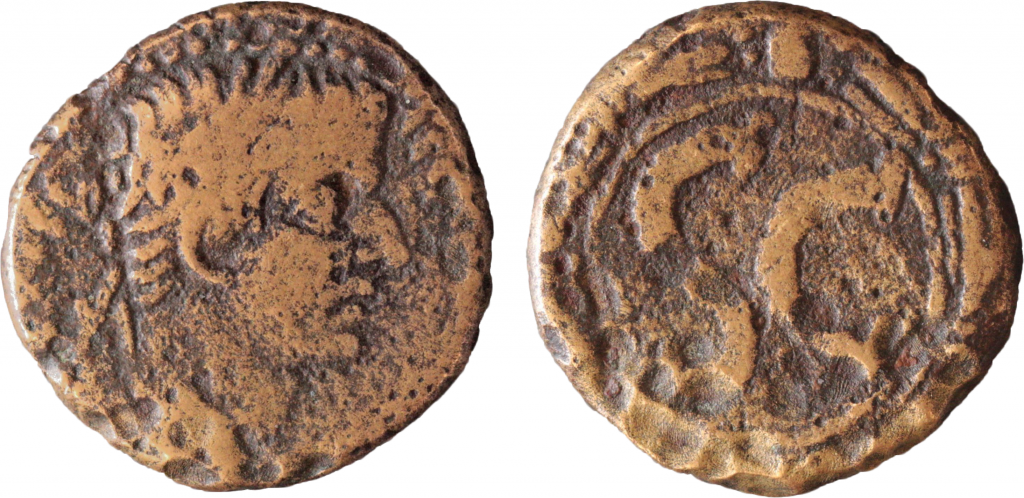June 26, 2016, by Will Leveritt
On this day in AD 4 Augustus organised the imperial succession
Text by Juliet O’Brien
Image by Sarah Jordan
He instructed his stepson, Tiberius, to adopt his own nephew, Germanicus, as his son. Augustus in turn adopted Tiberius as his son and heir, simultaneously designating Tiberius as his successor, and Germanicus as Tiberius’ eventual successor.

AE24 of Tiberius, from Antioch. Obverse has laureate head r. Reverse has SC within wreath. 2mm, 14.09g, 12 o’clock.
But Tiberius was very much Augustus’ reserve choice for the succession.
Augustus had no biological sons, and his first choice for successor seems to have been his nephew Marcellus. He was regularly seen in the emperor’s entourage and in 25 BC his position received a significant boost when he was married to the emperor’s daughter, Julia.
In 23 BC he received a number of honours which marked him out as a potential successor. Still aged only 19, he was enrolled in the Senate at the praetorian grade, given special dispensation to run for the consulship a decade earlier than was standard, and was elected aedile for 23 BC, well below the normal age. He held games in celebration supported by Augustus, but died suddenly the same year.
Later that year, Augustus married his daughter to his boyhood friend and closest ally, Agrippa. The marriage produced five children, including three sons. The eldest two sons, Gaius (born 20 BC) and Lucius (born 17 BC) were adopted by the emperor in 17 BC, becoming Gaius and Lucius Caesar.
Augustus promoted his adopted sons repeatedly in the years which followed. For example he made them principes iuventutis (heads of the youth) as each entered early manhood (around age 14) and each was designated consul for their respective twentieth years.
Despite being Augustus’ stepson, at no time did Tiberius receive such extraordinary honours. Indeed Suetonius suggests that jealousy of Gaius and Lucius led a bitter Tiberius to withdraw from public life to Rhodes in 6 BC.
At this point the succession must have seemed assured to Augustus. Yet by AD 4 both Gaius and Lucius were dead and the succession was in doubt once more.
The emperor, though angered by Tiberius’ retreat from public affairs, had allowed him to return to Rome in AD 2. Lucius died in Gaul that same year, but it was the death of Gaius in Armenia in AD 4 that prompted Augustus to adopt Tiberius, albeit somewhat reluctantly.
Augustus’ reasons for adopting Tiberius remain unclear. The Roman senator and historian Velleius Paterculus claimed this reflected Augustus’ faith in Tiberius’ abilities. But the more cynical Tacitus ascribes the decision to the intrigues of Livia, wife of Augustus and mother of Tiberius. It is said that she had plotted to clear a path for her son to succeed Augustus, perhaps even poisoning Marcellus.
In obliging Tiberius to adopt Germanicus – the son of his popular brother Drusus who had died in 9 BC – Augustus was seemingly attempting to consolidate the succession. But unlike Tiberius Germanicus was also biologically related to Augustus (his grandmother was Augustus’ sister Octavia) so it may be that the emperor was trying to ensure that his true bloodline would ascend the throne in the future.
The circumstances of this double adoption were surprising for another reason – Tiberius already had a son of his own, Drusus Minor. Despite this, Tiberius treated Germanicus with respect during the early years of his own principate after Augustus’ death in AD 14. Germanicus was awarded a triumph in AD 17 for his military victories in Germania between AD 14 and 16, and he shared a consulship with Tiberius in AD 18.
Nevertheless, Tacitus and Suetonius emphasise Tiberius’ jealousy of Germanicus for his popularity, increased by the victories in Germany. Tiberius sent Germanicus to Asia as commander in AD 18 and is said to have instructed the governor of Syria, Calpurnius Piso, to see to his death.
Germanicus did indeed fall ill and died in AD 19. The rumours were that Piso had poisoned him. Piso was put on trial but committed suicide before a verdict was reached.
The way must have seemed clear for Tiberius’ son Drusus to succeed him, but he too died before the emperor, in AD 23. Tiberius would eventually be succeeded by Germanicus’ son, Caligula.
No comments yet, fill out a comment to be the first

Leave a Reply